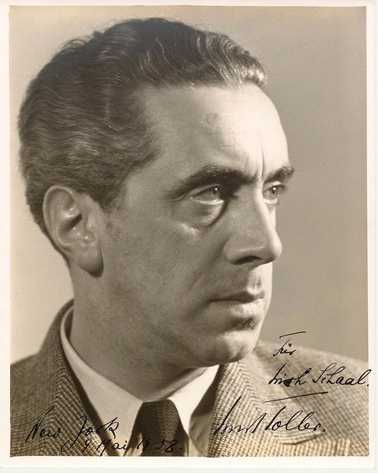Fifty Million Dollars for Spain: Ernst Toller’s Forgotten Relief Campaign
In the midst of the Spanish Civil War, the German writer Ernst Toller organized a multi-million-dollar international campaign to alleviate the hunger and misery of Spain’s civilian population. Although Toller’s herculean effort garnered broad support, it has been largely forgotten.
Born in 1893 from a Jewish family in Samotchin (East Prussia), Ernst Toller was one of the most prominent figures of his time. A playwright, political activist, and journalist, he was a typical representative of the interwar generation. He volunteered for World War I but found himself radicalized by his experience at the front. Despite his conversion to pacifism, he supported the revolution that followed the war. His involvement in the Soviet Republic of Munich (1918-19) cost him a five-year prison sentence. While in jail, he wrote his first and most important plays, which were acclaimed inside and outside Germany. After his release in 1924, Toller’s literary and political career garnered further international acclaim. He was among the most vocal opponents of the growing right-wing in the Weimar years. He was also among the first to warn of the danger posed by Adolf Hitler and to advocate for antifascist unity.
In 1931, he travelled to Spain to experience life under the Second Republic first-hand. His reports, written from a deep empathy with the country and its people, lucidly describe the Republic’s political and social challenges, which, he feared, helped prepare the ground for the emergence of fascism. In exile since Hitler’s rise to power in 1933, he actively fought Nazism, denouncing its crimes and continuing to call for antifascist unity.
From the beginning of the Spanish Civil War, Toller supported all initiatives in favor of the Republic, which he saw as a model of anti-fascist struggle. When, in July 1938, he travelled to wartime Spain, he was so deeply struck by the hunger and misery of the civilian population that he decided to set up a massive international relief campaign. With the approval of the Republican government, Toller began to collect data on the food situation and to seek broad support for his humanitarian initiative.
Knowing full-well that the Non-intervention Committee would block his project if aid was only provided to the Republican zone, he agreed with the Republican authorities to extend his project to the entire country, “based on need.” On August 26, 1938, in Madrid, he gave an important radio speech urging all the democratic powers, but especially President Roosevelt, to lend their support. He then traveled to Barcelona, where he continued to gather data, and to the Ebro front, where he met with the volunteers of the International Brigades.
By September, Toller had left Spain for a whirlwind international tour in search of support. His goal was to raise 50 million dollars—the equivalent of close to a billion dollars today. The plan was to use these funds to purchase surplus food from the democratic countries and send it to Spain to alleviate the shortages. In a few months’ time, Toller travelled to France, Great Britain, and the Scandinavian countries, where he managed to mobilize trade unions, the press, and progressive circles to support his relief project.
Finally, he convinced several European governments to lend their support, on the condition that U.S. President Roosevelt lead the initiative. Toller then traveled to the United States—as always, on his own dime. In the States, no one had heard of the project. Refusing to be discouraged, he began again to seek support. A news article by the New York Herald Tribune’s Dorothy Thompon, published on November 30, 1938, and titled “Intervene—With Food!” set off a wave of publicity and support. Even Eleanor Roosevelt joined. By January 1939, Toller had managed to pull together a committee to direct the implementation of his plan. An important first shipment of wheat was approved. The objective, it seemed, had been achieved.
Unfortunately, the project’s eventual success was overshadowed three months later by the defeat of the Republic and the international recognition of the Franco dictatorship. On 22 May 1939, exhausted and plunged into a deep depression, Toller—by then exiled in New York City—committed suicide. His funeral, at the Funeral Chapel of Broadway in Manhattan, found some five hundred German, Spanish and American antifascists in attendance. In his eulogy, Sinclair Lewis described Toller as “a symbol of the revolution.”
Ana Pérez, emerita professor of German Literature at the Complutense University of Madrid, writes about German antifascist exiles. From 1995 to 2012, she presided the Association of Friends of the International Brigades (AABI). Her new book Ernst Toller entre la II República y la Guerra Civil española has just been published by Comares (Granada).













